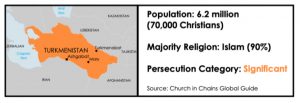
The Central Asian Republic of Turkmenistan was part of the Soviet Union until independence in 1991. Turkmenistan is mainly desert flanked by two populated strips of land, and despite having large gas reserves most people live in poverty. Its autocratic rulers have maintained tight control of all aspects of society since Soviet days. In March 2022 Serdar Berdymukhamedov became the third president, succeeding his father Kurbanguly, who had become president in 2007 following the death of Saparmurat Niyazov.
President Niyazov held dictatorial power from soviet times and styled himself Turkmenbashi (Father of the Turkmen), making himself president for life and spending public money on grandiose projects while slashing social welfare. He tightly controlled the army, police, justice system, economy and the press. President Kurbanguly Berdymukhamedov moved towards a less repressive system but the government still tightly controls religious and political activity, trade unions and the media and closely monitors internet use.
Religion is controlled by the government’s Commission for Work with Religious Organisations, established in 2015, which must approve all religious literature and any new places of worship. All religious communities must be registered.
Turkmenistan’s constitution grants freedom of religion but this is limited in practice to Sunni Islam and the Russian Orthodox church, with all other religions severely repressed. Even Islam is tightly controlled because of the fear of terrorism and some Muslims have been imprisoned in labour camp. Muslims worship in government-built and controlled mosques, and in recent years many mosques in the capital have been bulldozed because the authorities said they had been built without permission. Jehovah’s Witnesses face a particular problem because military service is compulsory for all young men and they, as conscientious objectors, face arrest and a maximum penalty of two years’ imprisonment, despite being willing to do alternative, non-military service.
Christians in Turkmenistan
Turkmenistan’s Christians are mostly ethnic Russians, Ukrainians and Armenians, and by far the majority of these are Russian Orthodox. It is almost impossible for non-Orthodox churches to obtain registration and worship in private homes is prohibited and is sometimes disturbed by police raids. At the time of independence there were only one or two ethnic Turkmen Christians but the number has increased to about one thousand. These Evangelicals have been refused registration and can only meet secretly, in homes or even cafés. Christians from a Muslim background can face violence from their families and communities and often lose their jobs.
The government is hostile to any independent Christian activity and the police target Evangelicals. They face arrest, interrogation, heavy fines and occasionally imprisonment, especially for meeting in unregistered gatherings, and religious literature is confiscated. (Religious literature may be sold by the Russian Orthodox church but it must be stamped as approved by the government’s Commission.) Police have raided summer camps and detained teenagers for hours without food or water. Secret police from the Ministry of State Security carry out surveillance of known or suspected Evangelicals and try to recruit agents to infiltrate and inform on gatherings.
2016 Religion Law
A new Religion Law was approved in the Mejlis (Parliament) in March 2016 and came into force in April, replacing the much-amended 2003 Religion Law. The 2016 law requires all religious communities to re-register and makes registration even more difficult as it increases the minimum number of adult citizens who must apply for legal status for a religious community from five to fifty. Many applications have been refused, forcing groups to meet illegally. The president claimed that a new law was needed because of the worldwide rise of terrorism and religious extremism.
(Forum 18, Operation World, Voice of the Martyrs, World Watch List)
